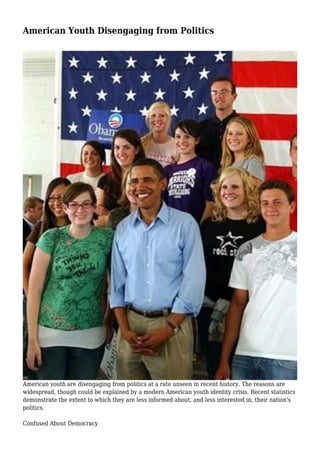
American Youth Disengaging from Politics
- 1. American Youth Disengaging from Politics American youth are disengaging from politics at a rate unseen in recent history. The reasons are widespread, though could be explained by a modern American youth identity crisis. Recent statistics demonstrate the extent to which they are less informed about, and less interested in, their nation's politics. Confused About Democracy
- 2. The Center for Information Research on Civic Learning Engagement (CIRCLE) compared the performance of 14-year-old students in the US to those in 27 other democratic countries. The data came from the IEA Civic Education Study. They were tested in 1999, meaning these students would be eligible to vote for the first time in 2004. It was found that students in the US demonstrated high levels of cognitive skills in interpreting political communication relative to those in other countries. However, they were significantly less informed than the average respondent on two very important questions about democracy and citizenship: citizen's political rights and the role of democratic citizens. Information about the above study can be found here. Not Following Politics According to Michael Carpini, in his article "Gen.com: Youth, civic engagement, and the new information environment," only 19 percent of those between 18 and 29 say they follow politics 'most of the time'. This number is particularly shocking when compared with those over 50, 51 percent of whom followed politics to a similar degree. Only 27 percent of first-year university students (in 1997) reported feeling that keeping up with public affairs was very important - a sharp decline from the 59 percent who reported the same in 1966. Less than 20 percent of 18- to 29-year-olds said they were proud of how democracy worked in the US, as compared with 50 percent of those over 50. Only 26 percent of those between 15 and 24 believed that being involved in democracy and voting was 'extremely important'. Only one in 10 young Americans between 18 and 29 can name both of their senators. (Article can be found in Political Communication (2000) 17:4, 341-349) Failed by School and Political Leaders? 'Lack of knowledge' was the reason given by 18 to 24-year-olds as one of the two most important reasons why young people do not vote, according to Carpini's study. One-third of young adults 18 to 29 say they follow the news every day, compared with 52 percent of those between 30 and 50, and two-thirds of those over 50. Newspaper readership among young adults is less than half what it was for the same age group in 1965. Carpini goes on to say that 61 percent of 18 to 24-year-old Americans believe that today's political leaders have failed them, yet one quarter of this age group think government http://www.fotoswiss.com/-/galleries/archive-international/golf-let-pga-usa/deutsche-bank-ladies-swis s-open-golf-club-losone/deutsche-bank-ladies-swiss-open-2010-let/sherlyn-popelka or elected officials have a major impact on their daily lives. No Say in Country's Politics Rashmi Shrivastava's study on political efficacy http://www.rockbottomgolf.com/ in youth may account for the low political interest in US youth. A massive 89 percent of US youth reported that people have no say in their country's politics. This number is astounding when compared with the 57 percent of Indian youth who responded similarly. American youth did seem to feel that they had some influence on their politicians (56 percent). In the US, it was found that most respondents had moderate to very high levels of PE. US minorities seemed to have lower PE than Christians, and English speakers were found to have higher PE than non-English speakers. Information about Shrivastava's study can be found here.
- 3. These numbers speak for themselves. It is astounding that so many youth can feel failed by their politicians and school systems in America. The self-perpetuating cycle of non- participation, followed by less attention from politicians, followed by less attention towards politics in the school system, could be broken with effort from all sides. Certainly the new US president, Barack Obama, has piqued youth interest, to a point. This could be the turn they need to break the cycle, but it will likely take more than words. Only time will tell the future for this generation with such potential - will they be given the tools to use it? For a recent history of American youth, refer to this article. You can also check out this article about Generation Y, of which American youth are a part.